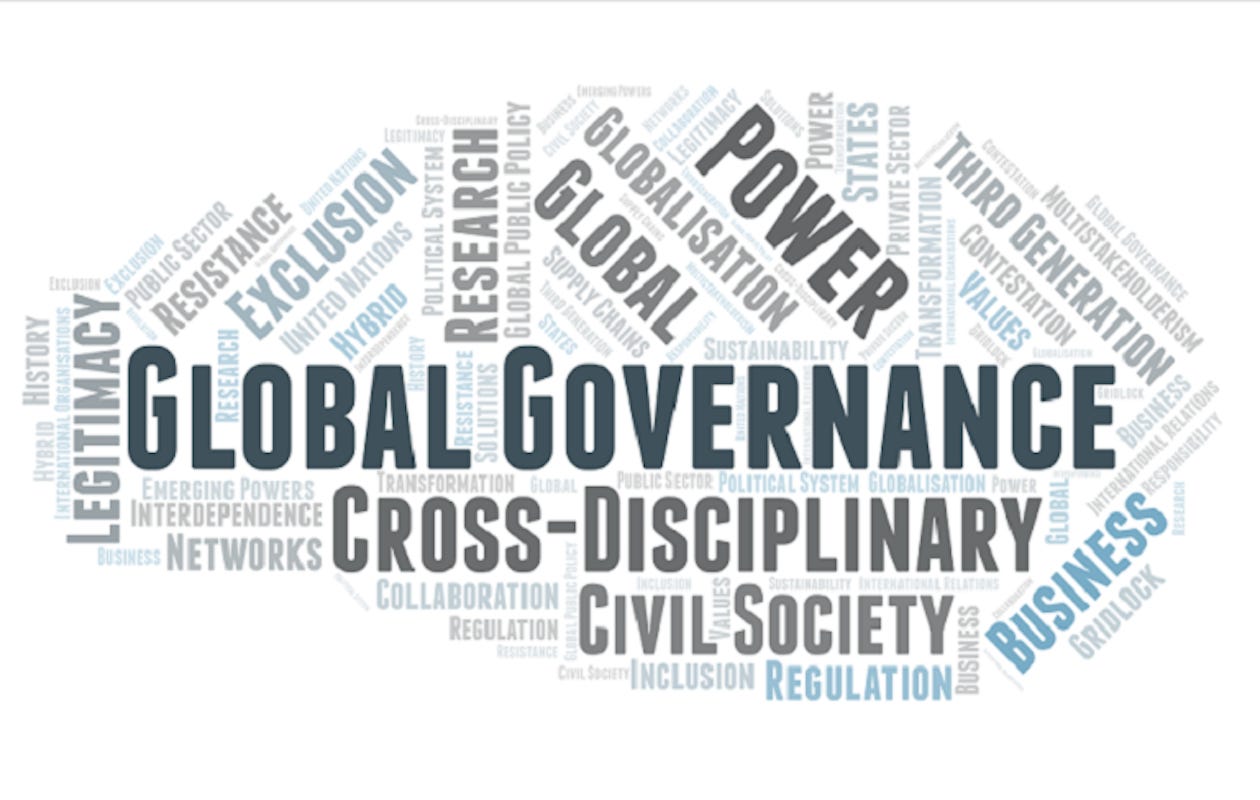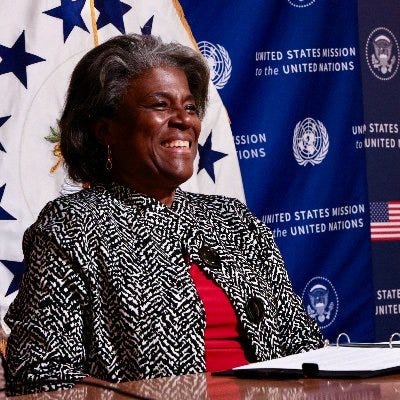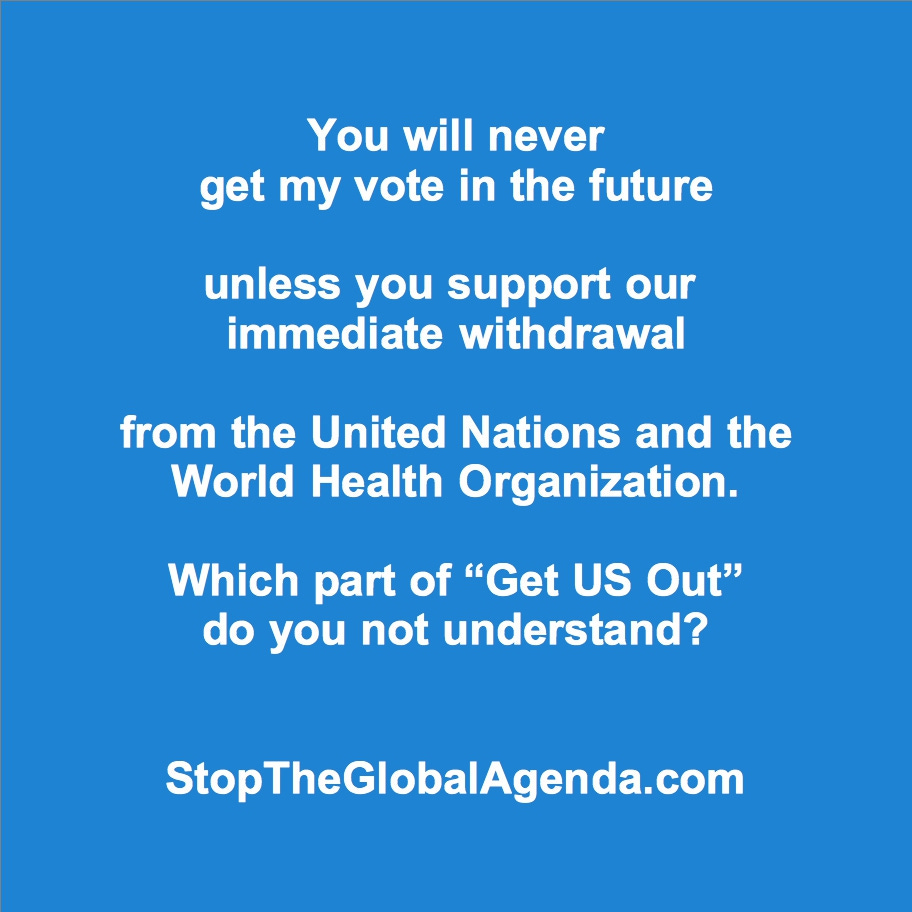Global Governance
The 193 members of the United Nations have until 1pm Eastern, September 3, 2024 to “break the silence” regarding the third revised version of the “Pact for the Future.” YOUR SILENCE IS YOUR CONSENT.
The United Nations has submitted the third revised version of the “Pact for the Future” to the 193 member nations in what they refer to as their “Silence Procedure.”
All 193 member nations have until 1pm Eastern, Tuesday September 3, 2024 to “break the silence” and reject the “Pact for the Future”.
Please watch the video below:
YOUR IMMEDIATE ACTION IS REQUESTED:
READ THE DOCUMENTS:
Silence Procedure Announcement Letter
https://www.un.org/sites/un2.un.org/files/sotf-co-facs-letter-rev.3.pdf
Pact for the Future
https://www.un.org/sites/un2.un.org/files/sotf-pact-for-the-future-rev.3.pdf
Declaration on Future Generations
https://www.un.org/sites/un2.un.org/files/sotf-declaration-on-future-generations-rev3.pdf
Global Digital Compact
If you object to any aspect of the “Pact for the Future”, then SHARE YOUR OPINION with America’s United Nations Ambassador Linda Thomas-Greenfield:
https://x.com/USAmbUN
@USAmbUN
https://usun.usmission.gov/mission/contact-us/
Download the image below and tweet it to America’s UN Ambassador:
Contact your nation’s UN representative:
https://www.un.org/dgacm/sites/www.un.org.dgacm/files/Documents_Protocol/headsofmissions.pdf
If you want the United States to #ExitTheUN, then click on the image below to download it to your phone, tablet or computer and then and share it far and wide.
StopTheGlobalAgenda.com
DEMAND THAT THE PACT FOR THE FUTURE BE REJECTED:
WHOWatch.org/RejectPactForTheFuture
Forbes:
Action 53 should gain the attention of the business community.
Action 53 is primarily focused on international finance as it relates to climate change.
[Action 55] The latest version states that countries will “encourage that the private sector, especially large corporations, contributes to sustainability and protecting our planet, including through partnership-based approaches, to scale up support to developing countries and enable climate action.”
As it is intended to be the final draft, Revision 3 of the Pact for the Future is now under silence procedure, a 72-hour review window where countries can raise objections to the final draft. The same procedure for the Declaration on Future Generations resulted in multiple objections, especially in the climate change sections. Expect similar actions on the Pact, and further revisions.
The fifth section of the “Pact for the Future” deals with “Global Governance.”
5. Transforming global governance
67. Today, our multilateral system, constructed in the aftermath of the Second World War, is under unprecedented strain. It has had remarkable achievements in the past eighty years. But we are not complacent about the future of our international order, and we know it cannot stand still. We will take action to strengthen and reinvigorate multilateralism and deepen international cooperation. We reaffirm unwavering commitment to international law, including the Charter, to address global challenges, some of which could overwhelm and threaten all of humanity. A transformation in global governance is essential to ensure that the positive progress we have seen across all three pillars of the United Nations’ work in recent decades does not unravel. We will not allow this to happen.
68. We must renew trust in global institutions by making them more representative of, and responsive to, today’s world and more effective at delivering on the commitments that we have made to one another and our people. We renew our commitment to multilateralism and international cooperation, guided by the Charter and the principles of trust, equity, solidarity and universality. We will transform global governance and strengthen the multilateral system to help us achieve a world that is safe, peaceful, just, equal, inclusive, sustainable, and prosperous.
Action 41. We will transform global governance and reinvigorate the multilateral system to tackle the challenges, and seize the opportunities, of today and tomorrow.
69. We resolve to make the multilateral system, with the United Nations at its centre, more:
(a) Effective and capable of delivering on our promises, with strengthened accountability, transparency and implementation mechanisms to ensure our commitments are met and to rebuild trust in global institutions.
(b) Prepared for the future, building capabilities and harnessing technology and data to anticipate risks, seize opportunities, act early and manage uncertainty.
(c) Just, democratic, equitable and representative of today’s world to ensure that all Member States, especially developing countries, can meaningfully participate in global decision-making in multilateral institutions.
(d) Inclusive, to allow for the meaningful participation of relevant stakeholders, while reaffirming the intergovernmental character of the United Nations and the unique and central role of States in meeting global challenges.
(e) Interconnected, to ensure that the multilateral system can draw together existing institutional capacities, work better as a system, overcome fragmentation and comprehensively address multidimensional, multisectoral challenges, while maximizing efficiencies.
(f) Financially stable, by ensuring adequate, sustainable and predictable financing for the United Nations, and to that end we commit to meet our financial obligations in full, on time and without conditions.
Action 42. We will reform the UN Security Council, recognizing the urgent need to make it more representative, inclusive, transparent, efficient, effective, democratic and accountable.
70. In response to the growing urgency to increase the effectiveness of the United Nations’ abilities to maintain international peace and security as set out in the UN Charter, we agree on the following guiding principles identified in the Intergovernmental Negotiations on the question of equitable representation on and increase in the membership of the Security Council and other matters related to the Council (IGN) in accordance with decision 62/557 of the General Assembly as parameters for reform:
(a) Redress the historical injustice against Africa as a priority and, while treating Africa as a special case, improve the representation of the underrepresented and unrepresented regions and groups, such as AsiaPacific and Latin America and the Caribbean.
(b) Enlarge the Security Council in order to be more representative of the current UN membership and reflective of the realities of the contemporary world and, taking into account our commitments of Sustainable Development Goal 16.8, increase representation of developing countries and small- and medium-sized states.
(c) Continue discussions on the issue of representation of cross-regional groups, taking into account that Small Island Developing States, Arab States, and others, such as the OIC, have been mentioned in the discussions of the IGN.
(d) Intensify efforts to find an agreement on the question of the categories of membership taking into account the discussions held in the IGN process.
(e) The total number of members of an enlarged Council should ensure a balance between its representativeness and effectiveness.
(f) The working methods should ensure the inclusive, transparent, efficient, effective, democratic and accountable functioning of an enlarged Council.
(g) The question of the veto is a key element of Security Council reform. We will intensify efforts to reach an agreement on the future of the veto, including discussions on limiting its scope and use.
(h) As part of a comprehensive reform, the inclusion of a review clause should be considered to ensure that the Security Council continues over time to deliver on its mandate and remains fit for purpose.
Action 43. We will strengthen our efforts in the framework of the Intergovernmental Negotiations on Security Council Reform as a matter of priority and without delay.
71. We support the Member States driven nature of the reform of the Security Council, and will intensify efforts for the reform through the IGN in accordance with General Assembly Decision 62/557 and other relevant resolutions and decisions of the General Assembly, such as resolution 53/30. Building on the recent progress achieved in the IGN, including through more transparency and inclusivity and by enhancing its institutional memory, we decide to:
(a) Encourage the submission of further models and the revision of already presented models by States and Groups of States for the structured dialogues with a view to developing a consolidated model in the future based on convergences on the five clusters, and the models presented by Member States.
Action 44. We will strengthen the response of the Security Council for the maintenance of international peace and security and its relationship with the General Assembly.
72. We will continue to improve and democratize the working methods of the Security Council and strengthen its relationship with the General Assembly, in accordance with and with full respect for their respective functions, authority, powers, and competencies as enshrined in the Charter, with the understanding that this should not substitute the reform of the UN Security Council outlined in Action 42. We decide to:
(a) Fully implement and adhere to all provisions of the United Nations Charter as they relate to the decisionmaking process in the UN Security Council, including Art. 27 (3) of the UN Charter.
(b) Support credible, timely and decisive action by the Security Council, in exercise of its primary responsibility for the maintenance of international peace and security, to prevent or end the commission of genocide, crimes against humanity or war crimes.
(c) Actively reinforce the ongoing efforts of the Security Council to review and enhance its working methods, including inter alia, penholding and co-penholding arrangements, and strengthen the cooperation and communication between the Security Council and the General Assembly and its subsidiary bodies, including the Peacebuilding Commission, as well as the Economic and Social Council and regional and sub-regional arrangements, including by continuing to fully implement and make use of General Assembly Resolutions 377A(V) (“Uniting for Peace”) and 76/262 (“Veto Initiative”).
(d) Improve the participation in and access to the work of the Security Council and its subsidiary organs for all members of the General Assembly, to enhance the Council's accountability to the membership and increase the transparency of its work.
Action 45. We will increase our efforts to revitalize the work of the General Assembly.
73. We reaffirm the central position of the General Assembly as the chief deliberative, policymaking and representative organ of the United Nations. We decide to:
(a) Further enhance and make full use of the role and authority of the General Assembly to address evolving global challenges, in full compliance with the Charter.
(b) Ensure that the selection and appointment process of the Secretary-General is guided by the principles of merit, transparency, inclusiveness and with due regard to gender balance and regional rotation and take into account during the next, and in subsequent, selection and appointment processes the regrettable fact that there has never been a woman Secretary-General, and we encourage Member States to consider nominating women as candidates.
Action 46. We will strengthen the Economic and Social Council to accelerate sustainable development.
74. We commit to strengthening the work of the Economic and Social Council as a principal organ for coordination, policy review, policy dialogue and recommendations on issues of economic and social development, recognizing the key role of the Council in achieving a balanced integration of the three dimensions of sustainable development and supporting the implementation of the 2030 Agenda. We decide to:
(a) Continue to strengthen cooperation between the Economic and Social Council and both the Security Council and Peacebuilding Commission and between the Economic and Social Council and the international financial institutions, in accordance with their respective mandates.
(b) Facilitate more structured, meaningful and inclusive engagement of non-governmental organizations in consultative status with the Economic and Social Council in the activities of the Council.
(c) Support the Council’s youth forum to enhance youth engagement ensuring that the forum is a platform for youth from across all regions to continue to share their ideas and engage in dialogue with Member States.
(d) Explore options, in the context of the forthcoming Thirtieth anniversary of the Fourth World Conference on Women, to revitalize the Commission on the Status of Women to promote the full and effective implementation of the Beijing Declaration and Platform for Action, to achieve gender equality, the empowerment of all women and girls, and promote and protect their human rights and to ensure that the Commission is fit for purpose.
Action 47. We will strengthen the Peacebuilding Commission.
75. We affirm our commitment to strengthening the Peacebuilding Commission through the 2025 review of the peacebuilding architecture to bring a more strategic approach and greater coherence and impact to national and international peacebuilding and sustaining peace efforts. We decide to:
(a) Enhance the role of the Commission as a platform for building and sustaining peace, including through sharing good practices among Member States and mobilizing political and financial support for national prevention, sustaining peace and peacebuilding efforts, in particular to avoid possible relapse into conflict, in accordance with the Commission’s mandate.
(b) Make greater use of the Commission to support Member States progress their nationally-owned and -led peacebuilding, sustaining peace and prevention efforts, and strengthen the Commission’s advisory, bridging and convening role, and encourage the Commission to consult with civil society, nongovernmental organizations, including women’s organizations, and the private sector engaged in peacebuilding activities, as appropriate, in line with the Commission’s mandate.
(c) Establish more systematic and strategic partnerships between the Commission and international, regional and sub-regional organizations, including the international financial institutions, to strengthen peacebuilding and sustaining peace efforts and to mobilize financing for sustaining peace and to help align national development, peacebuilding and prevention approaches.
(d) Ensure the Commission plays a vital support role to countries during and after the transition of a peace operation, in cooperation with the Security Council and supported by United Nations Country Teams, upon the request of the country concerned.
Action 48. We will strengthen the United Nations system.
76. We underline the importance of the United Nations system remaining effective, efficient and impactful. We decide to:
(a) Achieve a more agile, responsive and resilient United Nations, taking into account the UN 2.0 vision of enhancing the Organization’s capabilities in innovation, data analytics, digital transformation, strategic foresight and behavioral science to better support Member States and deliver on its mandates.
(b) Strengthen the United Nations development system, including the Resident Coordinator system, to make it more strategic, responsive, collaborative and integrated in supporting developing countries achieve the 2030 Agenda and address current, new and emerging challenges to sustainable development, in accordance with the Charter, and in support of national priorities and policies, including through United Nations Sustainable Development Cooperation Frameworks, recalling the decision to provide adequate, predictable and sustainable funding to achieve these goals.
(c) Ensure accessibility and disability inclusion at the United Nations to allow for the full, meaningful and effective participation and equality of persons with disabilities in all aspects of the United Nations’ work.
(d) Ensure the transparent and inclusive selection process of United Nations’ executive heads and senior positions with due regard for recruiting on as wide a geographic basis as possible and gender balance and adhere to the general rule that there should be no monopoly on senior posts in the United Nations system by nationals of any State or group of States.
Action 49. We will ensure the effective enjoyment by all of all human rights and respond to new and emerging challenges.
77. Following the seventy-fifth anniversary of the Universal Declaration of Human Rights and the thirtieth anniversary of the Vienna Declaration and Programme of Action, we remain committed to actively promoting and protecting all human rights and fundamental freedoms, including civil, political, economic, social and cultural rights. This includes the right to development. We recommit to realize our respective obligations to respect, protect and fulfill human rights and to implement all relevant international human rights instruments. All human rights are universal, indivisible, interdependent and interrelated. Human rights are mutually reinforcing and must be treated in a fair and equal manner, on the same footing, and with the same emphasis. The Sustainable Development Goals seek to realize the human rights of all. Individuals and civil society institutions, including non-governmental organizations, groups and national human rights institutions, where they exist, engaged in the promotion and protection of all human rights and fundamental freedoms for all, in accordance with national legislation and policies, must be protected from any form of intimidation and reprisals, both online and offline. We must continue to uphold human rights in the future by strengthening our capabilities to respond to existing, new and emerging challenges to the enjoyment of human rights. We decide to:
(a) Strengthen the Office of the United Nations High Commissioner for Human Rights and United Nations human rights mechanisms, in accordance with existing mandates, to enable them to respond to the range of human rights challenges facing the international community with impartiality, objectivity and non-selectivity.
(b) Request the Secretary-General to provide proposals to the General Assembly for adequate, predictable and sustainable financing of the Office of the United Nations High Commissioner for Human Rights and United Nations’ human rights mechanisms, with the aim of steadily and significantly increasing the resources, including from the regular budget, for the efficient and effective execution of their mandates.
(c) Enhance coordination and cooperation among United Nations entities working on human rights and avoid duplication of activities, within their existing mandates, including through closer coordination with the Office of the United Nations High Commissioner for Human Rights.
Action 50. We will accelerate reform of the international financial architecture to address the challenges of today and tomorrow.
78. Reform of the international financial architecture is an important step towards building greater trust in the multilateral system. We commend ongoing reform efforts and call for even more urgent and ambitious action to ensure that the international financial architecture becomes more efficient, more equitable, fit for the world of today and responsive to the challenges faced by developing countries in closing the SDG financing gap. The reform of the international financial architecture should place the 2030 Agenda at its centre, with an unwavering commitment to investing in the eradication of poverty in all its forms and dimensions. We decide to: (a) Continue to pursue deeper reforms of the international financial architecture to turbocharge implementation of the 2030 Agenda and achieve a more inclusive, just, peaceful, resilient and sustainable world for people and planet, for present and future generations.
Action 51. We will accelerate reform of the international financial architecture to improve the voice and representation of developing countries.
79. We acknowledge the important role of the United Nations in promoting sound global economic governance, while fully respecting existing governance mechanisms and mandates independent of the United Nations that preside over specific organizations and rules. We welcome the initiative to convene a Biennial Summit at the level of Heads of State and Government to strengthen existing and establish more systematic links and coordination between the United Nations and the international financial institutions, and we stress the importance of inclusive participation. We underscore the need for enhancing representation and voice of developing countries in decision-making in the international financial architecture especially the International Monetary Fund and the World Bank, to deliver more effective, credible, accountable and legitimate institutions. In addition to changes to quotas and voting power, we welcome other steps to improve the voice and representation of developing countries, such as the creation of a twenty-fifth chair on the IMF Executive Board for sub-Saharan Africa. We underscore the importance of improving diversity and gender representation in the Executive Boards, senior management and staff positions. These steps can equip these institutions to better address global challenges. We decide to:
(a) Call on the board of the IMF to take further steps to enhance the representation and voice of developing countries to help the IMF deliver its mandate more effectively.
(b) Call on the governing bodies of the World Bank and other multilateral development banks to ensure robust representation and voice of developing countries, while fully recognizing ongoing efforts in this regard.
Action 52. We will accelerate reform of the international financial architecture to mobilize additional financing to meet the Sustainable Development Goals, respond to the needs of developing countries and direct financing to those most in need.
80. Developing countries require enhanced access to financing from all sources to achieve the SDGs. Flows of capital to many developing countries are falling, and more capital is leaving many developing countries than is coming in. Multilateral development banks play a vital role in supporting sustainable development and the achievement of the SDGs and are critical to increasing countries’ access to finance on more affordable terms and helping to unlock private sector investment. We welcome ongoing reform efforts of the multilateral development banks to mobilize significantly greater financing for the 2030 Agenda, recognizing that further reforms of the Banks are urgently needed, in addition to the strengthening of domestic resource mobilization, and domestic policy and regulatory environments. We decide to:
(a) Deliver a robust twenty-first replenishment of the International Development Association (IDA), including contributions from both new and existing donors that significantly increases IDA’s resources, and establish a clear pathway to larger and more sustainable IDA funding by the 2030 replenishment.
(b) Call upon multilateral development banks to accelerate the pace of reforms to their missions and visions, incentive structures, operational approaches and financial capacity, and to consider additional steps to increase the availability of finance to developing countries to better address global challenges and further align their work with the sustainable development goals.
(c) Call upon the governing boards and management of multilateral development banks to enable additional finance from the banks’ own balance sheets by fully implementing, where relevant and appropriate, the recommendations from the G20 Independent Review of Multilateral Development Banks’ Capital Adequacy Frameworks by the end of 2026, including reflecting the value of callable capital in multilateral development bank capital adequacy frameworks and issuing hybrid capital at scale.
(d) Encourage the boards of multilateral development banks to schedule general capital increases and consider further general capital increases in the future, when appropriate, while recognizing recent capital contributions.
(e) Invite the multilateral development banks, in partnership with the Secretary-General, to present options and recommendations on new methodologies to improve access to concessional finance for developing countries, with full respect for the independent mandate and authorities of the respective governing body of each multilateral development bank.
(f) Notes the work of the international financial institutions, international organizations and multilateral development banks to consider structural vulnerability and invites them to consider using the multidimensional vulnerability index, as appropriate, as a complement to their existing practices and policies in line with their respective mandates.
(g) Call on multilateral development banks to provide timely support to developing countries by increasing the availability of long-term concessional finance, including lending in local currencies, as well as the design, financing and scaling up of country-owned and driven innovative mechanisms.
Action 53. We will accelerate the reform of the international financial architecture so that countries can borrow sustainably to invest in their long-term development.
81. Borrowing is vital for countries to invest in their long-term development. Countries must be able to borrow with confidence, sustainably, and have access to credit on more affordable terms, while ensuring full transparency. We are deeply concerned by the emergence of high and unsustainable debt burdens and vulnerabilities in many developing countries, the constraint this imposes on their development progress, and the weakness of safeguards to prevent these situations from occurring. We underline the importance of reforms to existing multilateral processes to facilitate collective action to prevent debt crises, facilitate debt restructuring and debt relief, when appropriate, taking into account evolving trends in the global debt landscape. We decide to:
(a) Strengthen the multilateral response to support countries with high and unsustainable debt burdens, with the meaningful participation of the countries concerned, creditors, both public and private, and the international financial institutions, ensuring an approach that is more effective, comprehensive, coordinated, systematic, transparent and timely to enable those countries to escape debt overhang and prioritize government expenditure on the achievement of the Sustainable Development Goals.
(b) Invite the IMF, in collaboration with the Secretary-General, the World Bank, the Group of 20 and major bilateral creditors, to review the sovereign debt architecture building on existing international processes, including by making proposals for establishing effective, efficient, equitable and comprehensive multilateral debt mechanisms, for promoting responsible lending and borrowing, for improving transparency, and for upgrading tools for debt sustainability analysis.
(c) Welcome the Secretary-General’s efforts to engage with credit rating agencies on their role in sustainable development and request the Secretary-General keep Member States updated on these discussions.
(d) Improve and continue to implement the G20’s Common Framework for Debt Treatments to enable effective, predictable, coordinated, timely and orderly restructuring processes and encourage steps to ensure comparability of treatment of sovereign and private creditors.
(e) Promote, where appropriate, the use of state-contingent clauses in all lending, including climate-resilient debt clauses when lending to developing countries vulnerable to hazards, including the adverse impact of climate change.
(f) Promote greater use of debt swaps for the SDGs, including debt swaps for climate or nature, to developing countries, as appropriate.
Action 54. We will accelerate the reform of the international financial architecture so that it supports countries equitably during systemic shocks and makes the financial system more stable.
82. The growing frequency and intensity of global economic shocks has set back progress on the achievement of the Sustainable Development Goals. We recognize the role of Special Drawing Rights (SDRs) in strengthening the global financial safety net in a world prone to systemic shocks, and their potential contribution to greater global financial stability. We welcome the pledges to rechannel over $100 billion worth of SDRs to developing countries while stressing the urgency of delivering on these pledges to developing countries as rapidly as possible. We decide to:
(a) Call on countries to continue to explore options to voluntarily rechannel at least half of SDRs from the 2021 allocation, including through multilateral development banks, while respecting relevant legal frameworks and preserving the reserve asset character of Special Drawing Rights.
(b) Encourage the IMF to explore all options to continue to strengthen the global financial safety net to support developing countries to better respond to macroeconomic shocks and explore ways to make rapid issuances of Special Drawing Rights and enable prompt, voluntary rechanneling to developing countries during future financial crises and systemic shocks.
(c) Welcome the IMF’s ongoing review of its surcharge policy and encourage a revision of the policy.
(d) Promote financial stability through international cooperation on, and consistent regulation of, banks and other financial service entities.
Action 55. We will accelerate the reform of the international financial architecture so that it can meet the challenge of climate change.
83. Climate change and biodiversity loss exacerbates many of the challenges facing the international financial architecture and can undermine progress toward the Sustainable Development Goals. Developing countries require access to finance to both address climate change and fulfil their critical development needs, including poverty eradication, and promoting sustainable, inclusive, resilient economic growth. The international financial architecture should continue to channel and increase financing towards both sustainable development and climate action. Investment in sustainable development and climate action are both essential, interlinked and mutually reinforcing. Developing countries face increasing financing needs, especially those vulnerable to the adverse impacts of climate change, leading to a growing demand for finance. We decide to:
(a) Call on Multilateral Development Banks to increase the availability, accessibility and impact of climate finance to developing countries, while safeguarding the additionality of climate finance, to support developing countries implement their national plans and strategies to address climate change.
(b) Call on Multilateral Development Banks to mobilize additional financing to support adaptation and deploy and develop renewable and energy-efficiency technologies in line with existing commitments.
(c) Call on international financial institutions and other relevant entities to improve the assessment and management of climate-related financial risks and support steps to address the high cost of capital for developing countries.
(d) Encourage that the private sector, especially large corporations, contributes to sustainability and protecting our planet, including through partnership-based approaches, to scale up support to developing countries and enable climate action.
Action 56. We will develop a framework on measures of progress on sustainable development to complement and go beyond gross domestic product.
84. We recognize that sustainable development must be pursued in a balanced and integrated manner. We reaffirm the need to urgently develop measures of progress on sustainable development that complement or go beyond GDP. These measures should reflect progress on the economic, social and environmental dimensions of sustainable development, including in the consideration of informing access to development finance and technical cooperation. We decide to:
(a) Request the Secretary General to establish an independent high-level expert group to develop recommendations for a limited number of country-owned and universally applicable indicators of sustainable development that complement and go beyond GDP, in close consultation with Member States and relevant stakeholders, taking into account the work of the Statistical Commission, building on the Global Indicators Framework for SDGs and targets of the 2030 Agenda for Sustainable Development and to present the outcome of its work during the eightieth session of the General Assembly.
(b) Initiate a United Nations-led intergovernmental process following the completion of the work of the independent high-level expert group in consultation with relevant stakeholders, including the UN Statistical Commission, international financial institutions, multilateral development banks and regional commissions, in line with their respective mandates, on measures of progress on sustainable development that complement or go beyond gross domestic product, considering the recommendations of the Secretary-General’s high-level expert group.
Action 57. We will strengthen the international response to complex global shocks.
85. We recognize the need for a more coherent, cooperative, coordinated and multidimensional international response to complex global shocks and the central role of the United Nations in this regard. Complex global shocks are events that have severely disruptive and adverse consequences for a significant proportion of countries and the global population, and that lead to impacts across multiple sectors, requiring a multidimensional multistakeholder, and whole-of-government, whole-of-society response. Complex global shocks have a disproportionate impact on the poorest and most vulnerable people in the world and usually have disastrous consequences for sustainable development and prosperity. An armed conflict does not by itself constitute a complex global shock, but conflict could, in some cases, lead to impacts across multiple sectors. The principles of national ownership and consent, equity, solidarity and cooperation will guide our future responses to complex global shocks, with full respect for international law, including the Charter and its purposes and principles, and existing mandates for United Nations intergovernmental bodies and processes, United Nations’ system entities, and specialized agencies. We will uphold the Secretary-General’s role to, inter alia, convene Member States, promote the coordination of the whole multilateral system, and engage with relevant stakeholders in response to crises. We request the Secretary-General to:
(a) Present for the consideration of Member States protocols for convening and operationalizing emergency platforms based on flexible approaches to respond to a range of different complex global shocks, including criteria for triggering and phasing out emergency platforms, ensuring that emergency platforms are convened for a finite period and will not be a standing institution or entity.
(b) Ensure that the convening of emergency platforms supports and complements the response of United Nations’ principal organs, relevant United Nations entities, United Nations-coordination entities and mechanisms, and specialized agencies mandated to respond to emergencies, and that it will not affect or interfere with the mandated role of any United Nations’ system entities, coordination entities, mechanisms or specialized agencies, intergovernmental body or duplicate ongoing intergovernmental processes, including the mandated role of the Security Council in the maintenance of international peace and security and with full respect for the United Nations’ mandated coordination role in response to humanitarian emergencies.
Action 58. We will strengthen international cooperation for the environment and the implementation of and compliance with our multilateral environmental agreements to deliver on our ambition to protect our planet.
86. We recognize the critical importance of tackling global environmental challenges to the future well-being of people and planet and the need to enhance synergies, cooperation or collaboration, as appropriate, when implementing our respective obligations under existing multilateral environmental agreements. We decide to:
(a) Explore options in the United Nations Environment Assembly to accelerate the implementation of and strengthen compliance with all multilateral environmental agreements to address global environmental challenges including the provision of means of implementation in the context of sustainable development efforts.
Action 59. We will strengthen our partnerships to deliver on existing commitments and address new and emerging challenges.
87. We recognize the importance of strengthening the United Nations’ engagement with national parliaments and relevant stakeholders, while preserving the intergovernmental character of the Organization. The challenges we face require cooperation not only across borders but also across the whole of society. Our efforts must involve Governments as well as parliaments, the United Nations system and other international institutions, local authorities, Indigenous Peoples, civil society, business and the private sector, faith-based organizations, the scientific and academic communities, and all people to ensure an effective response to our common challenges. We decide to:
(a) Ensure that relevant stakeholders can meaningfully participate in relevant United Nations’ processes and that Member States have access to the views and expertise of those partners on a systematic basis.
(b) Leverage existing channels and consider new approaches for continuous and open communication between United Nations intergovernmental bodies and civil society, allowing for ongoing dialogue, exchange of information and collaboration beyond formal meetings.
(c) Encourage the private sector’s contribution to addressing global challenges and strengthen their accountability towards the implementation of United Nations frameworks.
(d) Deepen United Nations’ engagement with national parliaments in United Nations intergovernmental bodies and processes, in accordance with national legislation, including through building on the efforts of the United Nations and Inter-Parliamentary Union to engage parliamentarians to maintain support for the implementation of relevant UN agreements and resolutions.
(e) Request the Secretary-General to provide recommendations on ways to strengthen the engagement of local and regional authorities at the United Nations by the end of the seventy-ninth session for Member States’ consideration, including on how United Nations’ engagement with local and regional authorities can contribute to the localization of the Sustainable Development Goals in line with national legislation and policies.
(f) Enhance cooperation between the United Nations and regional, sub-regional and other organizations, which will be critical to maintaining international peace and security, promoting and protecting human rights, and achieving sustainable development.
Action 60. We will strengthen the governance of outer space to foster its peaceful, safe, and sustainable uses for the benefit of all humanity.
88. The exploration and use of outer space for peaceful purposes is identified by international law as the province of all humankind. Humanity’s reliance on space is increasing day-by-day and we need global governance to be implemented. We are living through an age of increased access and activities in outer space. The growth in the number of objects in outer space, new space actors, including the increasing role of the private sector, the return of humans to deep space, and our expanding reliance on outer space systems demands urgent action. Safe and sustainable use of space plays a critical role in the achievement of the 2030 Agenda. The opportunities for people and planet are enormous, but there are also risks that must be managed. We encourage the Committee on the Peaceful Uses of Outer Space to further consult on the proposal to hold a fourth United Nations Conference on the Peaceful Exploration of Outer Space (UNISPACE IV) in 2027. We decide to:
(a) Implement existing global governance instruments and discuss the establishment of new frameworks for space traffic, space debris, and space resources through the Committee on the Peaceful Uses of Outer Space.
(b) Invite the engagement of relevant private sector, civil society, and other relevant stakeholders, where appropriate, to contribute to intergovernmental processes related to the increased safety and sustainability of outer space.
https://www.un.org/sites/un2.un.org/files/sotf-pact-for-the-future-rev.3.pdf
James Roguski
310-619-3055
JamesRoguski.substack.com/archive
All content is free to all readers.
All support is deeply appreciated.


















Contact your nation's representative:
https://www.un.org/dgacm/sites/www.un.org.dgacm/files/Documents_Protocol/headsofmissions.pdf
Thank you Mr. Roguski for the guidance to do this correctly